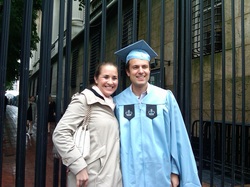
Before I left for NYC, I told my dad that I was taking the Megabus to NYC - the Megabus now has direct routes between several major cities, including Pittsburgh and New York. I was really pumped about what I knew would be a cool adventure - and about the low cost of it - $20.50 ROUND TRIP. You read that right - $20.50! It took about 4 more hours than the air travel would have, if I added up travel to the airport from home, and to and from the NYC airport by taxi, and the time needed to go through security, and the probable delays. (And I didn't have to deal with the flight cancellation that Tony and Julie experienced - which added about nine hours to their trip.) But I didn't think I would mind the extra few hours - no security lines, at least intermittent wi-fi and electricity, a couple of short stops to stretch my legs, a chance to meet new people in a place with a little more leg room than a plane, and LOWER COST!
My dad then mailed me an article about ideas for train travel in KY - here is another interesting article with an interesting factoid about trains....
....the upgrade of a freeway mile costs about $10 million, while the upgrade of a track mile costs $1 million. And a freeway lane will carry 2,000 people per hour, but a railway mile can carry 10 times that.
Dad said that he thought I just might blog about the environmental impacts of various types of travel - so this is what I am doing now! One way to measure environmental impact is to look at the carbon footprint of an activity or product - the amount of related CO2 (carbon dioxide) emissions. What are CO2 emissions and why is this issue important?
CO2 is emitted and absorbed as part of a natural carbon cycle involving plants, oceans, and animals, including humans. Since the 1700s and the onset of the Industrial Revolution, CO2 emissions into the atmosphere have increased significantly as a result of human activities involving the burning of oil, coal and gas, as well as deforestation. Higher CO2 emissions are associated with many 21st century activities that we take for granted - car travel, eating food that has been transported from another state or even country, eating processed foods or meat, wearing clothes that are manufactured on another continent and transported here. CO2 emissions - greenhouse gases - are implicated in climate change and global warming, which in turn have an effect on weather events, air/atmosphere quality, physical health, land preservation - these are all connected.
So - here is information about the different levels of CO2 emissions associated with different forms of transportation for one person - traveling to and from NYC and Pittsburgh:
- Train = .02 metric tons of CO2
- Coach = .04 metric tons - a coach is a fancy bus with a bathroom and larger seats than a city bus
- Plane = .14 metric tons - .11 for flight + .03 for cabs to and from airport to city
- Car = .24 metric tons based on Honda Fit automatic transmission
Greg Boulos, a Pittsburgh organic farmer and environmental activist, has said that the worst addiction that Americans currently have is the "addiction to convenience" - to wanting to get where we want to go whenever we want as fast as possible, as conveniently as possible; to eat what we want whenever we want to regardless of local growing seasons; to buy goods at the lowest cost regardless of the "true cost" involved in environmental impact, exploitation of factory workers, etc.
I have talked here about energy use and abuse, climate change related to human activities, social justice issues involved with all of this. I have talked a bit about peak oil and changes predicted for the future, the need to find alternative sources of energy rather than relying primarily on fossil fuels. The reality also is that we humans, particularly in the US, are called to examine and change our lifestyle - we can do it pro-actively or we can do it under duress when external circumstances demand that we change. Am I being unpatriotic when I say this - bashing our nation? Not at all - I am looking at data from many sources, including here - I urge you to click on this link and play with the site a little, and see what you think. It is not about guilt and defensiveness about how we live - it is about just thinking and exploring and imagining, and seeing where this takes you.
The good news about the changes that we can make is that we can benefit in so many ways beyond convenience and material comfort. On my bus trip, I met a young woman who is starting out on her career as an opera singer, and a young man who shared his extension cord with me when my outlet didn't work (he did admit, when asked, that he was an Eagle Scout - always prepared!), and listened to a large group of women who were returning home after a mission trip. We have much to gain socially, spiritually, physically, and mentally in doing things a little differently.
I would love to hear from you - let me know what you think!


 RSS Feed
RSS Feed
